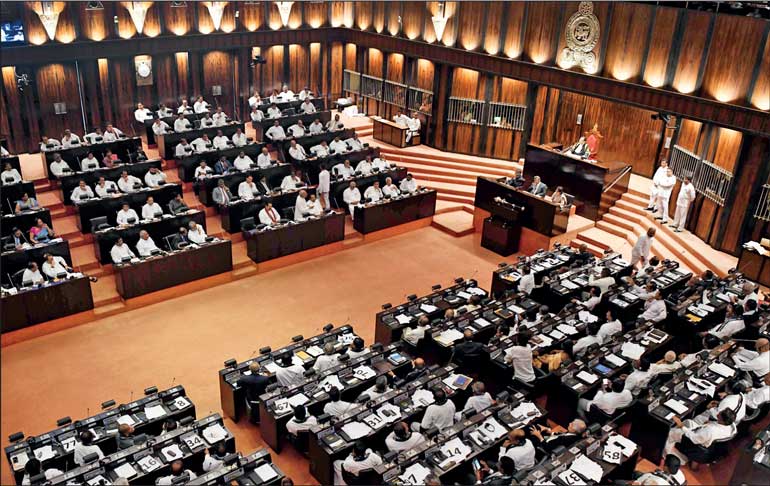Monday Feb 16, 2026
Monday Feb 16, 2026
Wednesday, 23 October 2024 00:20 - - {{hitsCtrl.values.hits}}

It is essential to focus on their ability to perform and define what makes an effective MP
 The recent election in Sri Lanka was a significant turning point, as a new leader was elected. It is crucial to form a capable team to govern the country and address the needs of the people. We have made significant progress in evaluating the qualities necessary for Members of Parliament and establishing fair and transparent selection procedures. However, we must prioritise the capabilities of the politicians over their identity and backgrounds. It is essential to focus on their ability to perform and define what makes an effective MP.
The recent election in Sri Lanka was a significant turning point, as a new leader was elected. It is crucial to form a capable team to govern the country and address the needs of the people. We have made significant progress in evaluating the qualities necessary for Members of Parliament and establishing fair and transparent selection procedures. However, we must prioritise the capabilities of the politicians over their identity and backgrounds. It is essential to focus on their ability to perform and define what makes an effective MP.
The upcoming general election is particularly interesting following the recent Presidential election. There is widespread discussion about regime change, creating a corruption-free country, and ensuring good governance. Sri Lanka is currently ranked 101st out of 180 countries, scoring 36 on the 2022 Corruption Perceptions Index (CPI). Most countries are failing to effectively combat corruption, and this needs to be addressed. The new President must navigate the country with a new team, which should prioritise professionals who are patriotic and practical (3Ps).
It is essential to build teams with a diverse mix of perspectives, rather than relying solely on academics, union leaders, and social activists, to avoid potential challenges in the future. This is a critical moment that requires us to avoid further setbacks, especially considering that Sri Lanka is already at a pivotal crossroads. While it may be simple to offer criticism from outside or opposition, the genuine test presents itself when one actively takes on responsibilities and faces the associated challenges head-on.
More than just average intelligence
Firstly, we believe that our leaders should be intelligent. We expect them to have more than just average intelligence and to possess a deeper understanding of the world around them. They should have at least some higher education and be able to read and write effectively. Education provides a critical view of the world and enables leaders to come up with effective solutions to problems.
Secondly, they should have an economist’s mindset. I feel that our political leaders often fail to grasp the concept of scarce resources and the fact that the government does not have an unlimited pool of money.
Thirdly, foresight is crucial. Our leaders need to have a broader view of things and not just focus on the present. Making promises without considering how to fulfil them has stretched the Government’s abilities beyond its means, leading to strikes by various professionals. Other countries like Norway, Qatar, KSA, and UAE can provide perks to their citizens because they have substantial sovereign wealth funds. However, in a country like Kenya that still relies on borrowing and foreign aid, offering continual freebies is not sustainable.
Fourth, humility is essential. Leaders are meant to serve the public and should prioritise public interests over their own. Politicians constantly asking for more allowances and benefits on top of their already salaries raise concerns. Leaders should be content with modest living standards without burdening the taxpayer.
Lastly, our leader needs to be anti-communal. Dividing people based on religion and caste during elections should not be tolerated. People should be free to form their own political opinions without any imposed presuppositions.
ABCD model for self-development
I would like to emphasise a very important personal trait which is the ABCD Model for self-development: I have developed a simple ABCD model that can be easily understood by anyone. It is based on Attitude, Behaviour, Commitment, and Discipline. When a new leader takes charge, whether in an organisation or a country, people are eager to see what qualities he or she possesses. When we discuss leadership qualities, we often think of generic attributes like honesty, fairness, humility, kindness, calmness, rationality, and justice. However, I would like to focus on the qualities I believe are essential in political leaders. I have chosen the first four letters of the alphabet, ABCD, to create a framework for guiding people in the right direction.
These four letters are easy to remember, regardless of their size. Although there is a lot of literature on Attitude, Behaviour, Commitment, and Discipline, they are usually discussed separately. I strongly believe that motivation is a derivative of ABCD. Attitude is a crucial component of effective leadership and personal success. Attitudes can be broadly categorised as positive or negative. Positive attitudes promote growth, development, and collaboration, while negative attitudes hinder progress and create a toxic work environment. A positive attitude comprises optimism, hope, belief, enthusiasm, humility, and gratitude, while a negative attitude is formed with pessimism, doubt, fear, ego, and entitlement.
Behaviour plays a vital role in self-management and group management. In simple terms, behaviour is the way you conduct yourself in a situation. Good or bad behaviour can either develop a person or lead to self-destruction. Commitment is the willingness to work hard and effectively to achieve the best results for oneself or an organisation. Finally, discipline fosters professionalism, productivity, and career advancement. In personal lives, discipline promotes self-control, resilience, and goal achievement.
Performance management and measurement
Public institutions have been facing increasing criticism and pressure in recent years to become more economically viable and customer-oriented. The transition from a traditional government department to a business management-focused organisation requires significant changes both internally and in its public image. Governments worldwide are under pressure to adopt “performance management and measurement” – focusing on program and service outputs and outcomes, and “managing for results”. This means that state and local governments are increasingly expected to be accountable for delivering results and utilising taxpayer money effectively. It is important to implement a performance evaluation system for policymakers, public servants, local government bodies, and national leaders. The Balanced Scorecard (BSC) is a valuable model for managing performance at various levels, from individuals to the country level.
In place of relying on election-time slogans and party manifestos, I firmly believe that our country would benefit from the establishment of a comprehensive mission statement aimed at fostering prosperity. This mission statement could encompass a range of objectives, including the enhancement of public values through the promotion of a corruption-free, clean, safe, secure, educated, systematic, and well-rounded environment for all citizens. My sincere hope and prayer are that the incoming president and their administration will be able to effectively lead the country toward a new era of progress and development.